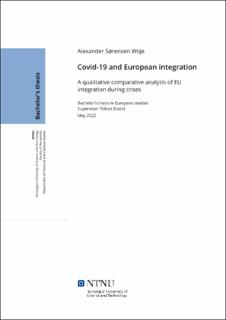| dc.contributor.advisor | Tobias Etzold | |
| dc.contributor.author | Woje, Alexander Sørensen | |
| dc.date.accessioned | 2022-06-25T17:20:28Z | |
| dc.date.available | 2022-06-25T17:20:28Z | |
| dc.date.issued | 2022 | |
| dc.identifier | no.ntnu:inspera:110337431:49592396 | |
| dc.identifier.uri | https://hdl.handle.net/11250/3000901 | |
| dc.description.abstract | Denne oppgaven utforsker hvordan europeiske kriser påvirker europeisk integrasjon ved å analysere og sammenligne COVID-19-krisen med både Eurozone-krisen og Schengen-krisen. For å gjennomføre denne analysen benytter jeg av en kvalitativ komparativ tilnærming, med bruk av liberal intergovernmentalisme og neofunctionalisme som teoretisk rammeverk for å forklare de ulike utfallene av integrasjon. Ved å benytte to ulike teorier, øker det forklaringskraften og bidrar til en styrket forståelse av hva som fører til integrasjon og ikke. Oppgaven konkluderer med at det er mer sannsynlig å oppnå integrasjon hvis problemene som oppstår omhandler økonomi, i motsetning til politiske problemer. | |
| dc.description.abstract | This thesis explores how European crises affect European integration by analyzing and comparing the COVID-19 crisis with both the Eurozone crisis and the Schengen crisis. To carry out this analysis, I use a Qualitative Comparative Approach with liberal intergovernmentalism and neofunctionalism as the theoretical framework to explain the different outcomes of integration. By using two different theories, it increases the explanatory power and contributes to a strengthened understanding of what leads to integration and not. The thesis concludes that it is more likely to achieve integration if the problems that arise concern the economic area unlike political areas, such as border control and migration where there is more difficult to find common ground. | |
| dc.language | eng | |
| dc.publisher | NTNU | |
| dc.title | Covid-19 and European integration during crises | |
| dc.type | Bachelor thesis | |
